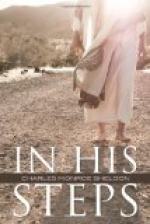There are times when a sermon has a value and power due to conditions in the audience rather than to anything new or startling or eloquent in the words said or arguments presented. Such conditions faced Henry Maxwell this morning as he preached against the saloon, according to his purpose determined on the week before. He had no new statements to make about the evil influence of the saloon in Raymond. What new facts were there? He had no startling illustrations of the power of the saloon in business or politics. What could he say that had not been said by temperance orators a great many times? The effect of his message this morning owed its power to the unusual fact of his preaching about the saloon at all, together with the events that had stirred the people. He had never in the course of his ten years’ pastorate mentioned the saloon as something to be regarded in the light of an enemy, not only to the poor and tempted, but to the business life of the place and the church itself. He spoke now with a freedom that seemed to measure his complete sense of conviction that Jesus would speak so. At the close he pleaded with the people to remember the new life that had begun at the Rectangle. The regular election of city officers was near at hand. The question of license would be an issue in the election. What of the poor creatures surrounded by the hell of drink while just beginning to feel the joy of deliverance from sin? Who could tell what depended on their environment? Was there one word to be said by the Christian disciple, business man, citizen, in favor of continuing the license to crime and shame-producing institutions? Was not the most Christian thing they could do to act as citizens in the matter, fight the saloon at the polls, elect good men to the city offices, and clean the municipality? How much had prayers helped to make Raymond better while votes and actions had really been on the side of the enemies of Jesus? Would not Jesus do this? What disciple could imagine Him refusing to suffer or to take up His cross in this matter? How much had the members of the First Church ever suffered in an attempt to imitate Jesus? Was Christian discipleship a thing of conscience simply, of custom, of tradition? Where did the suffering come in? Was it necessary in order to follow Jesus’ steps to go up Calvary as well as the Mount of Transfiguration?




